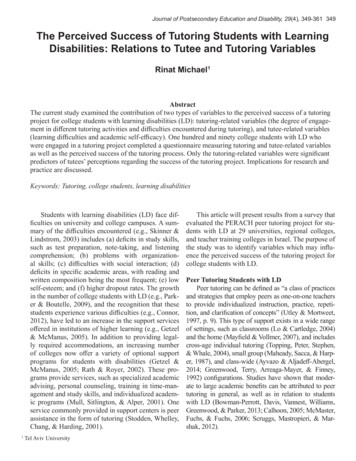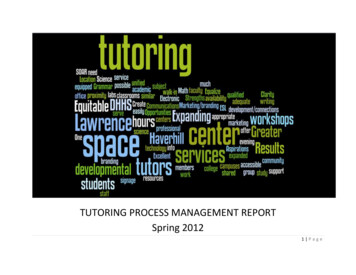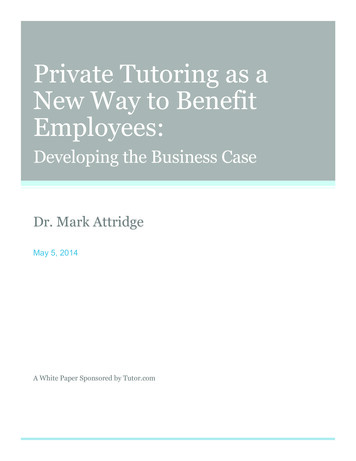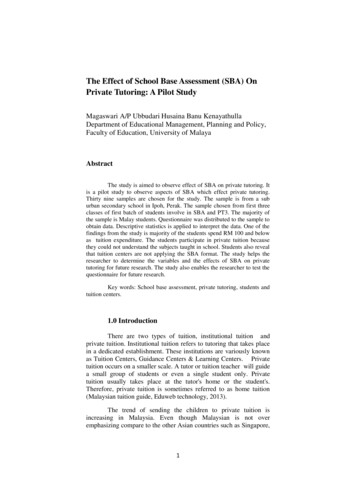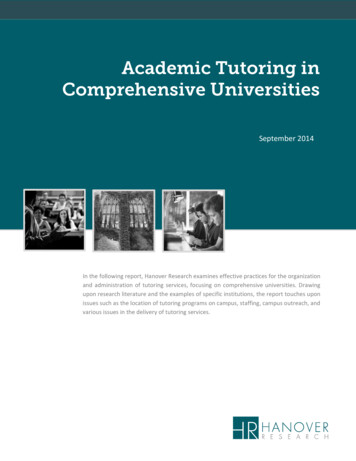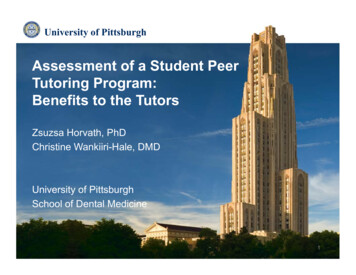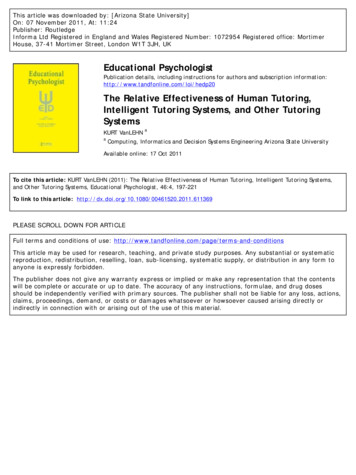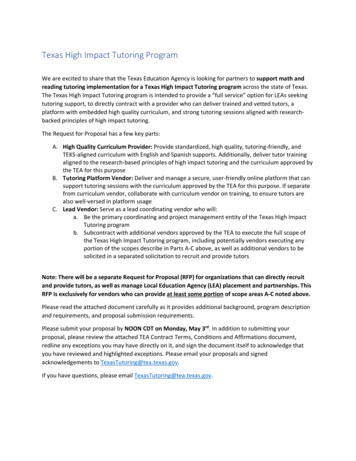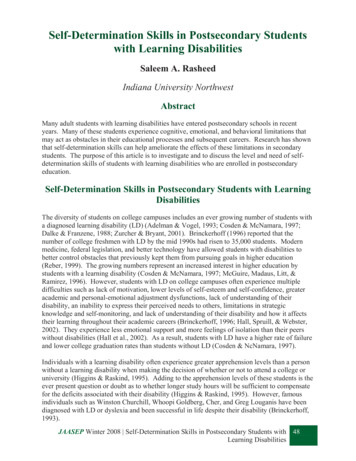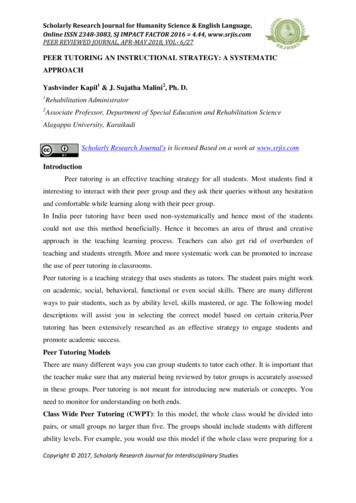
Transcription
View metadata, citation and similar papers at core.ac.uk2014, 37. 13-33brought to you byTutoring students with disabilities: survey of theinitiatives at Spanish and European universitiesTutorización de los estudiantescon discapacidad. Revisión de las iniciativasen las universidades españolas y europeasAnabel Galán-Mañas*Josep Maria Sanahuja Gavaldà**Montserrat Fernández Rodríguez***ResumenLas universidades europeas están poniendo enmarcha iniciativas para implantar planes de accióntutorial que proporcionen orientación y apoyo alos estudiantes mientras cursan estudios universitarios, si bien estos planes de acción tutorialesa menudo no contemplan acciones específicaspara los estudiantes con discapacidad. El objetivode este artículo es presentar una relación de lasactuaciones llevadas a cabo por 10 universidadesespañolas y 12 europeas, las cuales disponen deun servicio específico de atención al estudiante condiscapacidad. El análisis ha tenido en cuenta aquellas dimensiones más importantes en un plan deacción tutorial: promoción, acogida, permanenciay egreso. Según los resultados las universidadesespañolas y europeas dedican un mayor esfuerzoa buscar mecanismos de inclusión para los estudiantes universitarios con discapacidad durante supermanencia en la universidad, especialmente enla orientación sobre los estudios y la adaptacióncurricular. Asimismo, las universidades europeastienen más desarrolladas las actuaciones en elmomento del egreso y disponen de programas deorientación para la inserción laboral.Palabras clave:Joaquín Gairín Sallán****José Luis Muñoz Moreno*****Recibido: 13-01-2014Aceptado: 15-04-2014AbstractEuropean universities have begun to launch initiatives to implement tutorial action plans that provideguidance and support for students as they earntheir university degrees. However, these plansseldom include specific actions for students withdisabilities. The purpose of this article is to presenta list of the actions offered by 40 Spanish and 12European universities which have a specific servicecatering to students with disabilities. The analysisbore in mind the most important dimensions to beimplemented in any tutorial action plan, namelypromotion, orientation, retention and graduation.From the results we can glean that both Spanishand European universities devote most efforts toseeking mechanisms to include disabled universitystudents during their stay at the university, especially guidance on academic programmes andcurricular adaptations. Likewise, European universities, unlike their Spanish counterparts, implementmore actions at graduation and offer job insertionguidance programmes.Keywords:Tutorial action plan, tutoring students with disabilities, disability, inclusive education, universityPlan de acción tutorial, tutorización de estudiantes con discapacidad, discapacidad, educacióninclusiva, universidad.* Universitat Autònoma de Barcelonaisabel.galan@uab.cat** Universitat Autònoma de Barcelonajosep.Sanahuja@uab.cat*** Disabled Student Support Unit, FundacióAutònoma 8provided ISSN:by BibliotecaDigital de la Universidad de Alcalá**** Universitat Autònoma de BarcelonaJoaquin.Gairin@uab.cat***** Universidad de Valenciajose.l.munoz@uv.es13
A. Galán-Mañas, J. M. Sanahuja Gavaldà, M. Fernández Rodríguez, J. Gairín Sallán y J. L. Muñoz MorenoAcknowledgement:Spanish Ministry of Education’s “Tutorial Action Plan for Students with Disabilities” project as partof the call for participation in the 2011 Development of Projects and Actions Aimed at ImprovingComprehensive Care and Employability of University Students (reference CAIE037)1. IntroductionA lot of work remains to be done to make the principles of equal rights, non-discrimination, equality and social justice an everyday part of our educational system. In the ongoingstruggle to achieve this, organisations such as the World Education Forum (UNESCO,2000), the UN Convention on the Rights of Persons with Disabilities (UN, 2006) and theEuropean Disability Forum (2009) stress the social, economic, political and legislativechanges needed to secure the development of educational inclusion processes whichstrive to understand, address and respond to the educational needs of all students.Inclusive education, which has been on the upswing since the 1990s, is defined as theeducation of individuals with special educational needs at conventional education centresas opposed to at special centres (Ruijs, Van der Veen and Peetsma, 2010; Ainscow andCésar, 2006; Meijer, 2001; Ruijs and Peetsma, 2009; Salend and Garrick, 1999).As Parrilla (2002) noted, inclusive education does not signal a new approach to education,nor is it limited to the sphere of education; rather it stresses equality above difference andembodies a new ethics and cultural and educational enrichment throughout the entireeducational system. However, educational inclusion is described as an open, dynamicprocess under constant construction and analysis, so the time dimension sometimesposes the complex dilemma of the right to inclusion contrasted with the conditions underwhich this inclusion takes place. Therefore, it is necessary for all the different areas withinthe public administration to promote educational systems that are capable of welcoming all students, regardless of their abilities, interests or needs, and to provide them withthe support they need. It is important for educational actions aimed at developing eachindividual to the utmost of their abilities to be conducted based on social participationand interaction with people in the surroundings. Therefore, these actions must respect thevalue of the disability and include relationships of recognition established in spaces thatare open to uncertainty. And in this context, universities neither can nor should remainapart from the educational currents that value diversity and strive to follow the pathwayof social and educational inclusion.In recent years, the principle of equal opportunity has gained particular prominence in social policies. The United Nations and the European Union, through the Rome Declarationon Education (2002) and the European Council Resolution dated the 5th of May 2003,have asked European governments to particularly support disabled university studentswith appropriate tutoring systems and support services.14
Tutoring students with disabilities: survey of the initiatives at Spanish and European universitiesIn Spain, Organic Law 4/2007 (article 44) on universities guarantees the principle of equalopportunities and non-discrimination for any reason, including disability, in access touniversities, admission into centres, retention at universities and the exercise of academicrights. This law also stipulates that means, support and resources that ensure real, effective equal opportunities in relation to the other components of the university communityshould be promoted, and that specific support programmes be established, such aspersonalised help, support and adaptations to the educational system.In the same vein, the 2011 Statute of University Students (Chapter II, article 4) stipulatesequal opportunities and regularisation to ensure that students with disabilities can participate actively in different dimensions of university life. Specifically, it states that eachuniversity should promote the creation of services that cater to the disabled universitycommunity.As the outcome of these kinds of policies and regulations, in recent years we have witnessed an increase in the number of students with disabilities attending university, eventhough they still only account for 0.5% of the student body (Royal Board on Disability, 2007:35), and despite the fact that university policies to support students with disabilities have notalways risen to the needs of this demographic surge (Abad, Álvarez and Castro, 2008: 131).Higher education institutions, as promoted by the European Higher Education Area, havebegun to launch initiatives to implement tutorial action plans that provide guidance andsupport to students as they study at the university (Gairín et. al., 2009). These tutorial action plans seldom contain actions that meet the needs of students with disabilities, whoare left solely with the universities’ disabled student support services, if they exist, despitethe fact that one of the compulsory quality standards required by the EHEA is preciselyservices for students with disabilities.According to figures from the Royal Board on Disability (2007: 55), around 75% of Spanishuniversities already have programmes or services to support students with disabilitiesin place. In the case of European universities, the majority have these services and arefurther supported by a unit devoted exclusively to ensuring the principles of equality andnon-discrimination, such that all students enjoy the same opportunities, not only in termsof their abilities but also in terms of religion, race, sexual orientation and other traits.In order to meet the needs of the students with disabilities at the Universitat Autònoma deBarcelona, a Tutorial Action Plan for Students with Disabilities was developed, financedby the Ministry of Education’s “Tutorial Action Plan for Students with Disabilities” projectas part of the call for participation in the 2011 Development of Projects and Actions Aimed2014, 37. 13-3315
A. Galán-Mañas, J. M. Sanahuja Gavaldà, M. Fernández Rodríguez, J. Gairín Sallán y J. L. Muñoz Morenoat Improving Comprehensive Care and Employability of University Students (referenceCAIE037). The purpose of the project was to develop a document which defines theagents, actions and times at which the university should serve this group.As a step prior to designing the plan, it was imperative to identify what kinds of actions arecurrently underway at Spanish and European universities in order to ascertain the state ofthe issue as well as to inform the groundwork of the plan being proposed. To this end, inthis article we present a comparative analysis of the actions being conducted at a seriesof 40 Spanish and 12 European universities. We should note that the sample of Europeanuniversities was chosen for having a unit to support students with disabilities and theirpositive references on advances in tutoring them, and that the goal is thus not to compareSpain and Europe but to detect the areas for improvement that will bring Spanish universities closer to their European counterparts that are renowned in this sphere.2. Beneficiaries of disabled university student servicesWhen we embarked upon our analysis of the services provided to students with disabilities at Spanish and European universities, we first noted that the concept of disabilitydiffers from one country to another.Indeed, in its Convention on the Rights of Persons with Disabilities, the United Nationsrecognises that disability is a concept that is evolving and that stems from the interactionbetween people with impairments and the barriers around them. According to the WorldHealth Organization (2001), disability is a generic term that includes impairments, limitations and restrictions in participation; it indicates the negative aspects of the interactionbetween an individual (with a “health condition”) and their contextual factors (environmental and personal factors). Along the same lines, the United Nations (2006) notes thatpersons with disabilities include those who have long-term physical, mental, intellectualor sensory impairments which may hinder their full, effective participation in society underequal conditions as others as they interact with diverse barriers. Consequently, disabilityis a complex phenomenon which reflects an interaction between the characteristics of thehuman organism and the characteristics of the society in which it lives.With the goal of being able to determine the kinds of disability that university studentsmay have when they reach the university, we have devised the following classification: Physical motor disability: needs of support for mobility. This can be associated with avariety of disorders: cerebral palsy, spinal injuries, degenerative diseases, fibromyalgia,muscular dystrophy, paraplegia, etc.16
Tutoring students with disabilities: survey of the initiatives at Spanish and European universities Organic physical disability: any organic disease that requires medical-health care. Thiscategory includes renal diseases (chronic kidney failure), heart problems, cancer, immunological issues, etc. Visual sensorial disability: blindness, low vision and other eye conditions. Auditory sensorial disability: deafness, deafness in one ear, hypoacusis, etc. Intellectual disability: borderline intellectual functioning, chromosomal alterations associated with cognitive limitations, etc., borderline mental retardation, Down Syndrome, etc. Anxiety disorders: psychotic disorders, generalised anxiety disorders and personalitydisorders. General developmental disorders: Asperger’s Syndrome and autism. Learning disabilities: dyslexia, attention deficit disorder (ADD) with or without hyperactivity, etc.3. Services for students with disabilities at Spanish universitiesIn recent years, university services set up to help disabled persons have spread to a significant number of Spanish public universities due, among other reasons, to the legislativechanges that were enacted in 2007, which made it possible to create specialised servicesat universities that did not previously have them and to consolidate these services wherethey already existed.According to recent figures (Fundación Universia, 2013), today there are 75 specific services or university disabled student support programmes, which means that the majorityof public universities and a significant number of private universities in Spain have somekind of service or programme to cater to students with disabilities as part of the universitystructure.With regard to the services they offer, we noted some heterogeneity among the universities, some of which depended upon the requirements and kinds of disabled universitystudents and the human and economic resources available to cater to them at eachinstitution.By analysing the information published in the resource guide in Universidad y Discapacidad(University and Disability, put out by the Spanish Committee of Representatives ofDisabled Persons, 2006), the services offered to students with disabilities can be classified as follows: technical resources (specific software and a bank of technical resourceproducts); human resources (personal assistants, sign language interpreters); support fortransport and mobility (disabled-accessible transport service); accessibility programmes;2014, 37. 13-3317
A. Galán-Mañas, J. M. Sanahuja Gavaldà, M. Fernández Rodríguez, J. Gairín Sallán y J. L. Muñoz Morenocurricular adaptations; tutoring programmes; job placement programmes; specific scholarship programmes; specific volunteer programmes for students with disabilities.The support services for disabled university students are one way of channelling andspearhead accessibility measures, technical support, accompaniment and other personal support measures. This then guarantees an accessible university environment andrespect for the principles of universal accessibility and respect for everyone in the curriculum, as stipulated by Organic Law 4/2007 (Section XIV), as well as design for everyoneand universal accessibility as stipulated by Law 51/2003 (article 2) on equal opportunities,non-discrimination and universal accessibility for disabled persons.As noted by the Royal Board on Disability (2007), universal accessibility is no longer associated with merely eliminating architectural barriers and now extends to all kinds ofspaces, products and services with the goal of guaranteeing the principle of equal opportunities proclaimed by democratic states. This principle evens out opportunities, lowersdisadvantages, reduces risks, improves performance and productivity and consequentlycontributes to improving everyone’s quality of life, especially individuals with some sortof disability (Montero, 2002: 122).The specific services offered by European universities mainly revolve around providingspecific support and supplying the universities with the equipment needed by the studentsto whom their programmes are targeted (Abad, Álvarez and Castro, 2008: 135). However,despite the fact that at first glance we might believe that the services for students with disabilities at Spanish universities display a kind of paternalistic attitude towards this group,the fact is that these services end up offering support that offsets the shortcomings ofSpain’s social policies.Generally speaking, the Spanish university services aimed at catering to students withdisabilities provide the following kinds of support (Royal Board on Disability, 2007: 78):guidance, monitoring and assistance; note-taking; sign language interpreters; personalassistance; elimination of barriers (urbanistic, architectural, communicative, technological- accessible learning materials); provision of alternative and/or augmentative communication services; technical and material support and equipment to adapt the study area;access to communication and information in the classroom; accessible transport; accessible housing; promotion of volunteerism; job placement programmes.Even though students who suffer from one of the disorders or disabilities mentionedabove may benefit from the disabled university student services, in Spain not all of them,such as those with learning disabilities, are granted the disabled accreditation issued18
Tutoring students with disabilities: survey of the initiatives at Spanish and European universitiesby the Spanish healthcare services, unlike students with these disabilities in the otherEuropean countries analysed.4. Tutorial action for disabled university students:Key juncturesDuring the course of university studies there are different key junctures when studentshave to define their academic project and take the actions needed to bring it to fruition.The studies by Gallego (2004), Delaney (2004) and Lim (2002) confirm the need to develop guidance and orientation activities prior to entry into the university. Abad, Álvarezand Castro (2008: 138 and 140) also suggest that a tutorial action plan for disableduniversity students cannot begin when the students enter the university classrooms butshould get underway during secondary school and should continue throughout the jobsearch process and the transition to the working world. In fact, the studies by Arias etal. (2005) and Fita and Álvarez (2005) note the significance of the benefits of tutorial andguidance actions for students during their time at the university, while González andMartín (2004) and Bethencourt et al. (2008) concentrate on job orientation for universitystudents.As revealed in the aforementioned studies, any tutorial action plan conducted at the university should include the measures needed at four key junctures: a) the transition fromthe different avenues leading to the university (baccalaureate, higher-level vocational programmes, students over the age of 25, 40 and 45, the job market, etc.) to the universityitself; b) the orientation along the studies, which is precisely when the student reachesthe university, has to enrol and engage in the different services offered by the university,and informes about specific educational needs so that the faculty can be aware of anyadaptations that must be made; c) as they study, since academic guidance is neededat times when the student must take decisions on their future, such as choosing certainspecialisations, or when they require assistance in handling learning difficulties, along withadvice on more personal issues; and d) the transition from the university to the job market,when students with disabilities can do internships in institutions and/or companies and itis useful for them to have information on job profiles, job possibilities and other issues thatcan guide their professional career, as well as securing agreements with organisationsthat promote the hiring of disabled persons.Below we provide further detail on the actions that can be performed at each of these keyjunctures in order to better serve university students with special needs.2014, 37. 13-3319
A. Galán-Mañas, J. M. Sanahuja Gavaldà, M. Fernández Rodríguez, J. Gairín Sallán y J. L. Muñoz Moreno4.1. PromotionPromotional actions consist primarily of informative actions that strive to spread awarenessof the universities’ disabled student services. These services are generally open to providingpre-university training to any organisation, individual or group seeking admission to theuniversity.The ways Spanish universities can be accessed include baccalaureate, higher-level vocational training programmes, individuals over the ages of 25, 40 and 45, and the job market.In order to promote their programmes to different groups, universities organise a rangeof activities, including participation in educational fairs and salons, visits to secondaryschools to offer informative talks on the different programmes they offer, information dissemination in town halls, and agreements to conduct baccalaureate research projects inconjunction with the university.In this kind of activity, it is imperative to provide academic information on the structure ofthe different programmes, the relevant laws, electives, specialities, the real length of thedegree programmes, scholarships, job opportunities, training to adapt the programmesand information on the services (sports, culture, healthcare, support, etc.) offered by theuniversity, and to specifically target them at disabled persons. However,this informationis rarely targeted at disabled persons.For our analysis, we have divided promotional actions into: Informative and dissemination actions, namely those through which the university provides information on its programmes outside its campus, such as at town halls orspecial student services run by the regional governments. The purpose is to present theuniversity’s full range of academic programmes and services and to provide informationand guidance so that secondary school students can choose the programmes in whichthey wish to enrol. At educational fairs and salons, students receive information and personalised guidance on the post-compulsory academic programmes and job opportunities. At theseevents, universities and centres offering vocational training courses have an exhibitorto whom they can direct students to receive information on the programmes that bestfit their interests and skills. Sometimes the disabled student support unit begins its preparatory work while thestudent is still in compulsory secondary school. To do this, they have to coordinate withthe secondary school teachers in order to identify the disabled student’s needs earlyon. This enables them to ascertain the most important adaptations and support that thestudents have received at secondary school.20
Tutoring students with disabilities: survey of the initiatives at Spanish and European universities Talks at secondary schools help universities to get in closer contact with studentswithout the latter having to travel, and to inform them about the university’s differentacademic programmes and services so that they can choose the ones that best matchtheir potential. Pre-university orientation refers to academic orientation sessions that cover both thecurricula in the degree programmes in which the students wish to enrol and informationon the documentation needed to pre-register, cut-off marks, etc. Visits to universities serve the same purpose as the talks at secondary schools, except that this time the students are the ones who travel to the university. On thesevisits, not only are talks held on the academic programmes available to them, butcampus tours are also organised. The purpose of these visits is to show studentsthe entire range of programmes and services that the university offers and to provideinformation and guidance on choosing majors for individuals seeking admission tothe university through any of the possible avenues. Visits to faculties are organisedby field of study. Likewise, Family Days are targeted at the families of students intheir last year of baccalaureate and higher-level vocational training programmes, andtheir goal is to familiarise the families of future students with the university campus,academic programmes and services.4.2. OrientationOrientation activities tend to consist of providing information and guidance that is of interest to students with disabilities as a group when they arrive at the university. The trainingand counselling of faculty, families and administrative staff is gradually becoming morewidespread; sometimes guidance and study support guides are even written for thesethree stakeholders and for students with disabilities. Still, very few institutions organiseand manage orientation and tutorial programmes for the initial enrolment of students withdisabilities at the university in which they are informed about which courses to register for.This juncture should also be used to identify and assess the specific educational needsthat students have or may have because of their disability.The orientation actions we analysed include: Open houses and informative sessions, which consist of talks providing direct information on the campus and counselling students and their families on the university’sadaptations and services targeted at catering to the specific needs arising from disability. The services that students with disabilities may find at the university includecomputers with more innovative technological resources to ensure access to infor-2014, 37. 13-3321
A. Galán-Mañas, J. M. Sanahuja Gavaldà, M. Fernández Rodríguez, J. Gairín Sallán y J. L. Muñoz Morenomation, including software, voice recognition or character enlargement programmes,and adapted peripherals (mouses and keyboards). Universities may also offer adaptedhousing for persons with reduced mobility, accessible transport, additional coursesand free-time activities. Another service made available to students with disabilities isthe choice of having a study support student who can take notes or provide support inlaboratory experiments or in library searches. Tutoring for enrolment. Students with disabilities receive guidance on the enrolmentprocedure or the courses and study plans they may pursue, and they may even be accompanied on registration day. Orientation programme. Each department tends to organise a series of informative activities held during the first week of class. The purpose of these sessions is to integratestudents into university life and into their programme as quickly as possible. During theorientation sessions, students are shown the tools with which they can work, such asthe virtual campus and library and the computer resources available to them. Guidance service. This consists of help and guidance on study techniques. The primarymission of an educational-psychological guidance service is to provide a personalisedresponse to certain needs of the university community (students, professors and administrative staff) with difficulties in decision-making, learning and adaptation in order toimprove their choices and the personal planning of their degree programme, their overallperformance and their personal wellbeing. This service fulfils its mission through an academic and personal guidance process, assistance and educational-psychological help. The guide to professional and family orientation, which is used to provide brief information on job possibilities for students and to inform the family about the resourcesavailable to their children. Study training and help. The educational-psychological advisement unit offers trainingon study techniques and learning targeted at all university students so that they can getthe most from their university degree.4.3. RetentionThe actions to be performed during students with disabilities’ stay at the university are directly related to the evolution of their academic programme and their need for support, aswell as to the goals of lowering drop-out rates and encouraging retention. This is preciselythe juncture when students with disabilities ask for support in order to seek information, communication and participation in the university setting. Partnership mechanismsamong the different educational stakeholders (faculty, students, specific support services,etc.) should also be put into place during students with disabilities’ stay at the university.In short, the goal is to guide students both academically and personally.22
Tutoring students with disabilities: survey of the initiatives at Spanish and European universitiesTo facilitate an analysis of the actions carried out during students with disabilities’ time atthe university, we can list the following kinds of actions: Academic guidance and monitoring. This is unquestionably one of the most importantactions during this period. It includes actions aimed at guiding students with disabilities as they acquire the academic competences needed in the programmes in whichthey are enrolled and to monitor their learning process. This may entail reviewing thecontents of each course or planning the subjects to be taken in a given time period. Personal/life counselling. The students’ stay at the university means that the counselling processes will go beyond the strictly academic and encourage the development ofinclusion within the university setting. This could include access to housing, transportor free-time venues to share with their classmates. Study techniques and support. Throughout their time at the university, students withdisabilities may be offered a variety of study techniques and support that provide no
their university degrees. However, these plans seldom include specific actions for students with disabilities. The purpose of this article is to present a list of the actions offered by 40 Spanish and 12 European universities which have a specific service catering to students with disabilities. The analysis
